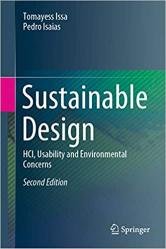 Название
Название: Sustainable Design: HCI, Usability and Environmental Concerns, 2nd Edition
Автор: Tomayess Issa, Pedro Isaias
Издательство: Springer
Год: 2022
Страниц: 225
Язык: английский
Формат: pdf (true), epub
Размер: 14.6 MB
In this book, we examine the importance of human–computer interaction (HCI), usability, and sustainability, as well as the concept of sustainable design, in the information communication and technology (ICT) sector. ICT usage by businesses and individuals has become a significant instrument for searching, conducting research, communication, entertainment, commerce, and information. However, the recycling of ICT hardware is becoming a major dilemma for businesses and individuals since it is not simply a matter of concern for environmental damage or a solution to an environmental problem. Designers, businesses, and individuals must make a concerted and collaborative effort to tackle environmental concerns by developing new ICTs that incorporate sustainable designs in order to meet the current and future needs of businesses and individuals while minimizing the negative effects on the environment. This book discusses the features of sustainable design and proposes a New Participative Methodology for Sustainable Design (NPMSD).
Computer technology, Internet technology, and associated systems are essential tools in the twenty-first century since businesses and individuals have come to depend increasingly on them rather than on the traditional systems used to achieve the same ends. Today’s technology is more capable of managing and assisting businesses and individuals to complete their tasks far more efficiently. Not only is there a proliferation of stand-alone computers; networking on a global scale has increased enormously as a result of the Internet, World Wide Web, social networks, mobile systems, intelligent environments, and other technological developments. The increasing usage of ICT worldwide presents a new challenge to HCI researchers and practitioners who need to cater for the needs of businesses and individuals while ensuring that emerging technologies are more sustainable for both current and future needs. HCI is the study of the interaction between humans and complex technology and concerns the way that the current input and output of technologies influence the interaction between a user and the interface. HCI draws on many disciplines, but it is in “computer science and systems design that it must be accepted as a central concern, and HCI involves the design, implementation, and evaluation of interactive systems in the context of the user’s task and work”.
The term “human–computer interaction” was adopted in the mid-1980s to describe this new field of study. HCI “is a discipline concerned with the design, evaluation, and implementation of interactive computing systems for human use and with the study of major phenomena surrounding them”. However, this field is now “concerned with understanding, designing for, and evaluating a wider range of user experience aspects”. Therefore, the reason for studying HCI in the development process is to create interactive computer systems that are usable as well as practical. The main purpose of incorporating in the design the features related to HCI is to develop an efficient and effective user interface to suit user requirements and wishes. Hence, HCI specialists need to involve the users in the design process, integrating different kinds of knowledge and expertise and making the design process iterative.
Sustainable Design is an invaluable resource for students and researchers, designers and business managers who are interested in the human-centered, environmental concerns of sustainable technologies.
Content:
1. Introduction
2. Usability and Human–Computer Interaction (HCI)
3. User Participation in the System Development Process
4. Physical, Cognitive, and Affective Engineering
5. Color, Prototyping and Navigation, Principles and Guidelines Design, Evaluation and Testing, and Task Analysis
6. Models and Methodologies
7. New Participative Methodology for Sustainable Design (NPMSD)
8. Innovative Technologies: Applications in the Present and Considerations for the Future
Скачать Sustainable Design: HCI, Usability and Environmental Concerns, 2nd Edition
[related-news]
[/related-news]